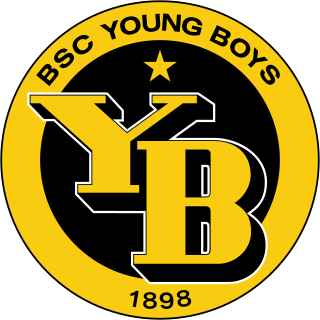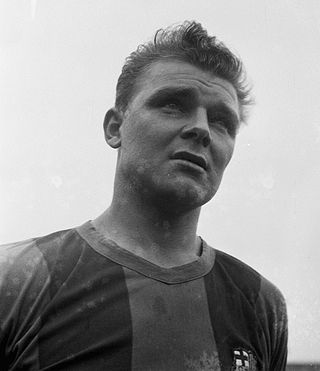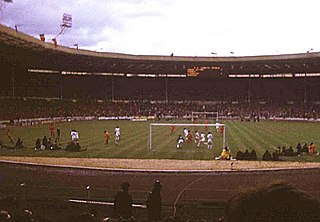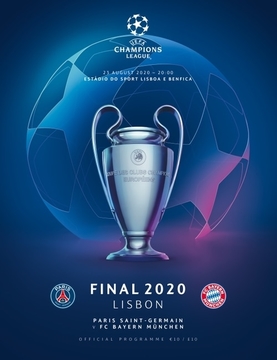
BSC Young Boys are a Swiss sports club based in Bern, Switzerland. Its first team has won 15 Swiss league championships and six Swiss Cups. YB is one of the most successful Swiss football clubs internationally, reaching the semi-finals of the European Cup in the 1958–59 season. The club's colours are yellow of a golden shade and black.

Sándor Péter Kocsis was a Hungarian footballer who played for Ferencváros TC, Budapest Honvéd, Young Fellows Zürich, FC Barcelona and Hungary as a striker. During the 1950s, along with Ferenc Puskás, Zoltán Czibor, József Bozsik and Nándor Hidegkuti, he was a member of the Mighty Magyars. After the 1956 Hungarian Revolution, he moved to Spain where he became a member of the FC Barcelona team of the late 1950s.

László Kubala was a Hungarian-Slovak professional footballer who also had Spanish citizenship. He played as a forward for Ferencváros, Slovan Bratislava, Barcelona, and Espanyol, among other clubs. Regarded as one of the best players in history, Kubala is considered a hero of FC Barcelona. A Hungarian national by birth, he also held Czechoslovak and Spanish citizenship, and played for the national teams of all three countries.

This page details statistics of the European Cup and Champions League. Unless notified these statistics concern all seasons since inception of the European Cup in the 1955–56 season, and renamed since 1992 as the UEFA Champions League. Does not include the qualifying rounds of the UEFA Champions League, unless otherwise noted.
The history of the European Cup and UEFA Champions League spans over sixty years of competition, finding winners and runners-up from all over the continent.

Mário Esteves Coluna was a Portuguese footballer who played mainly as a central midfielder.

José Augusto Pinto de Almeida, known as José Augusto, is a Portuguese retired footballer who played as a right winger, and a coach.

The 1960–61 European Cup was the sixth season of the European Cup, UEFA's premier club football tournament. The competition was won by Benfica, who won 3–2 in the final against Barcelona, who had knocked out Spanish rivals Real Madrid, winners of the first five tournaments, in the first round. Benfica was the first Portuguese team to reach the final and to win the tournament. For the first time a Norwegian club participated.

The 1967–68 European Cup was the 13th European Cup, UEFA's premier club football tournament. The competition was won by Manchester United, who beat Benfica 4–1 in the final at Wembley Stadium, London. The European Cup title marked the tenth year since the Munich air disaster, in which eight United players were killed and their manager, Matt Busby, was left close to death, the day after earning a place in the semi-finals of the 1957–58 competition. It was also the first time an English side had won the trophy.
Ferdinand Daučík was a Slovak football player and manager. Daučík was the manager of several La Liga clubs, most notably Barcelona, Atlético Bilbao, Atlético Madrid and Real Zaragoza. During his career, he managed La Liga clubs in 488 matches, won three La Liga titles and won the Copa del Generalísimo on five occasions and won three La Liga/Copa doubles. He died in Alcalá de Henares.
Evaristo de Macedo Filho,, known simply as Evaristo, is a Brazilian former footballer and coach.
The 1968 European Cup Final was the final match of the 1967–68 European Cup, the premier club football competition in Europe. It was played at Wembley Stadium in London, England, on 29 May 1968, and contested by Benfica of Portugal and Manchester United of England in front of a crowd of 92,225. Both teams had to go through four rounds of two-legged knockout ties to reach the final; it was Benfica's fifth European Cup final, two of which they had won, and Manchester United's first.
Football clubs from La Liga (Spain) have won a record 68 continental and worldwide titles. Real Madrid, the most successful of them, have won the European Cup on 14 separate occasions and claimed 28 trophies in total. Barcelona have won twenty continental and worldwide titles, while Atlético Madrid have claimed eight. Valencia and Sevilla have each won seven trophies to their name. Additionally, Deportivo La Coruña have been regulars in the UEFA Champions League, while Athletic Bilbao, Espanyol, Alavés, Zaragoza and Mallorca have all contested major finals in second-tier competitions and below. Smaller La Liga clubs, like Villarreal, Celta Vigo and Málaga have also found success in Europe, reaching the latter stages of the Champions League and winning the Europa League, as is the case with Villarreal.

The 1989 European Cup Winners' Cup Final was a football match contested between Barcelona of Spain and Sampdoria of Italy. It was the final match of the 1988–89 European Cup Winners' Cup and the 29th European Cup Winners' Cup final. The final was held at Wankdorf Stadium in Bern, Switzerland, on 10 May 1989. Barcelona won the match 2–0 thanks to goals by Julio Salinas and Luis López Rekarte.

Sport Lisboa e Benfica is a Portuguese professional football club based in Lisbon whose involvement in European competition dates back to the 1950s. As champions of Portugal, Benfica were supposed to participate in the inaugural edition of the European Cup in 1955, but they were not invited by the organizers. Two years later, Benfica made their European debut against Sevilla in the European Cup, on 19 September 1957.

The 2014 UEFA Champions League final was the final match of the 2013–14 UEFA Champions League, the 59th season of Europe's premier club football tournament organised by UEFA, and the 22nd season since it was renamed from the European Champion Clubs' Cup to the UEFA Champions League.

The 2014 UEFA Europa League Final was the final match of the 2013–14 UEFA Europa League, the 43rd season of Europe's secondary club football tournament organised by UEFA, and the fifth season since it was renamed from the UEFA Cup to the UEFA Europa League. It was played at the Juventus Stadium in Turin, Italy on 14 May 2014, between Spanish side Sevilla and Portuguese side Benfica. Sevilla won the match 4–2 on penalties, following a 0–0 draw after extra time.

The 2015 UEFA Champions League final was the final match of the 2014–15 UEFA Champions League, the 60th season of Europe's premier club football tournament organised by UEFA, and the 23rd season since it was renamed from the European Champion Clubs' Cup to the UEFA Champions League. It was played at the Olympiastadion in Berlin, Germany, on 6 June 2015, between Italian side Juventus and Spanish side Barcelona.
The 1960–61 season was Sport Lisboa e Benfica's 57th season in existence and the club's 27th consecutive season in the top flight of Portuguese football, covering the period from 1 August 1960 to 30 July 1961. Benfica competed domestically in the Primeira Divisão and the Taça de Portugal and participated in the European Cup after winning the previous league.

The 2020 UEFA Champions League final was the final match of the 2019–20 UEFA Champions League, the 65th season of Europe's premier club football tournament organised by UEFA, and the 28th season since it was renamed from the European Champion Clubs' Cup to the UEFA Champions League. It was played on 23 August 2020 at the Estádio da Luz in Lisbon, Portugal, between French club Paris Saint-Germain, in their first European Cup final, and German club Bayern Munich. The match was held behind closed doors due to the COVID-19 pandemic in Europe.















